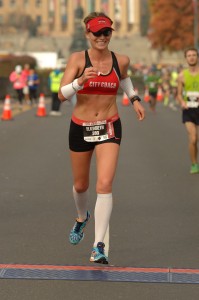 Most runners have the same post-goal race process. While we recover, we analyze and go over moments that seem like a blur from the recent race. It’s our time to mentally process what we achieved, failed to achieve, and how to move forward.
Most runners have the same post-goal race process. While we recover, we analyze and go over moments that seem like a blur from the recent race. It’s our time to mentally process what we achieved, failed to achieve, and how to move forward.
In the days following the Philly Marathon, I was in something of a fog. Perhaps that was due to my immune system finally collapsing, and therefore battling a cold. My lead-like legs certainly were due to the beating I put them through over 26.2 miles, and my left IT Band made sure I was aware that it wasn’t happy. As my body slowly recovered from race day, and then took on a cold, my head had some time to wrap around just what happened during those 3 hours and 5 minutes I spent on the race course.
One of my team mates, when she saw my crazy negative split, asked me if that was a half marathon PR, achieved during the second half of my marathon. Her question got me thinking. No, it was not a PR for the Half Marathon, but it certainly was a fast second half. Her question got me thinking about myself as a runner, a human, and other PRs.
After some analyzing past race stats, I was reminded that some of my PRs were contained in larger race distances. For example, my 10K PR was the first 10K of the 10 MILE Broad Street Run in 2012. Yes folks, apparently I can run a 10K FASTER when I still have 4 miles to go than I can when towing the line for a 10K.
My question: why?!?
Sure, the elevation and weather are factors, but why is it that my PR for a 10K hasn’t happened at a 10K race? Clearly it’s mostly not solely physical. So, what’s going on in my head? And if something goes on in my head, does the same thing go on in YOUR head? This made me think about my clients and their goals. Why is it we sometimes struggle and other times we blow ourselves out of the water?
Perhaps mentally, it’s easy to put up a mental block against certain numbers and distances. Perhaps for me, when I wasn’t thinking about the possibility or option of a 10K PR in 2012(my mind was focused on the 10 MILE PR), my body and mind didn’t even register that a 10K PR would have to happen in order for the 10 mile PR to occur. Maybe we get in our way more than we are aware.
Another example of mental madness: As previously mentioned in past blogs, I struggled with speed this Spring. Getting my speed back after injury and rest was tough. Before the 2013 Broad Street Run in May, I struggled HARD to hit 7:00 miles during tempo runs. I remember feeling completely unprepared as I stepped up to the starting line. You know what I ran for 10 miles? 6:33s. No, it wasn’t my best 10 mile race, but I was so shocked and confused as to how I pulled that out of myself when I had struggled to clock 7:00 miles for a few miles at a time. Once again, how and where did that come from?
Unfortunately, I don’t know. I wish I had the answer.
I clearly remember my first marathon, where I went into it determined to set a BQ. Failure was not an option in my mind, and I didn’t have anything to compare my first marathon to. I didn’t doubt it, or even really think about how hard a BQ was for most people. I just went out and did it. Sure, it turned out I had above average running abilities, but I am also going to argue that sometimes ignorance is bliss. Knowledge is power, but sometimes being a know-it-all or a veteran means we can psych ourselves out, or “decide” before the gun goes off what we are capable of, instead of just going for it.
As I ponder over my most recent marathon, I am left wondering how I can knock down any preconceived limitations I have put on myself. And as a coach, how can I help other runners see past their perceptions of who they are as runners. Is there a way to combine the bliss of ignorance and the power of knowledge to create a mentally stronger athlete? Of course we all of our own limitations. I, for one, will most likely never win a marathon. However, who am I to say what “time” I am capable of? The future is unwritten. And that goes for you, too.



